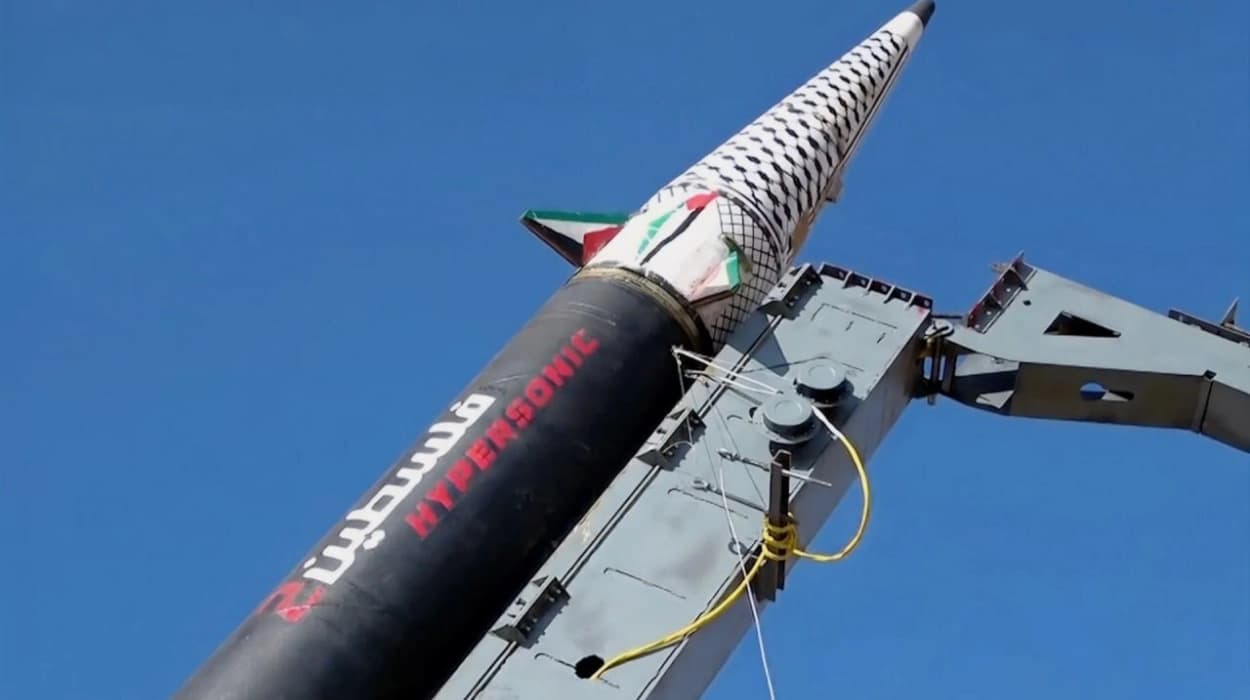Yemen’s armed forces, aligned with the Ansarallah
(Houthi) movement, have claimed responsibility for firing
a hypersonic ballistic missile, named “Palestine-2,”
targeting Ben Gurion Airport in Tel Aviv as a part of
their solidarity campaign with Gaza. The claimed strike has
disrupted air traffic, triggered mass alerts across central
Israel, and underscores escalating regional tensions
amid ongoing Israeli operations in Gaza.
Yemeni Forces Unleash Hypersonic Missile on Tel Aviv, Claiming Solidarity with Gaza
In a significant escalation of regional
military tensions, Yemeni armed forces launched a hypersonic
ballistic missile at Ben Gurion Airport in Tel Aviv,
announcing the operation as an act of solidarity with the
Palestinian people amid the ongoing Israeli campaign in Gaza.
The strike, representing a major advancement in Yemen’s
military capabilities, was carried out with a newly unveiled
missile, the “Palestine-2”.
The Operation as Reported by Yemeni Officials
As reported by Brigadier General Yahya Saree, spokesperson for the Yemeni Armed Forces, in a broadcast on Al-Masirah TV and cited by Ilkha News,
“The operation was successfully carried out and, by the grace of God, caused millions of Zionists to flee to shelters and brought airport operations to a halt”.
Saree described it as a
“special military operation,” with explicit targeting of
Israel’s key commercial and military airport infrastructure.
Tasnim News added context, reporting Saree’s declaration that the operation was
“conducted in coordination with recent strikes by the Iranian Armed Forces and the Islamic Revolution Guards Corps against the criminal Zionist enemy.”
Saree commended Iran for
“courageous and unwavering resistance to the Zionist regime’s brutal aggression”.
Reports from Israeli Media and Official Responses
According to Middle East Monitor and China Daily,
Israeli defence systems intercepted the missile before it could
reach its target, with Israeli Channel 12 News
reporting that shrapnel from the missile caused a fire near
Jerusalem. No casualties were reported, and airport operations
at Ben Gurion were temporarily halted for takeoffs
and landings. Alarms were reportedly triggered in both Tel
Aviv and Jerusalem, prompting millions of residents to seek
shelter.
“Earlier in the day, the Israeli occupation army said in a statement that it successfully intercepted a missile launched from Yemen,”
reported Middle East Monitor, confirming swift mobilisation by
Israel’s air defences.
Solidarity and Retaliation: Statements by Yemeni Officials
The repeated attacks by Yemeni forces are framed by them as acts of
“solidarity with the Palestinian people in Gaza and the wider Resistance front,”
according to statements aired on Al-Masirah TV and cited by several outlets, including Tehran Times and Palestine Chronicle. Brigadier General Yahya Saree of the Yemeni Armed Forces asserted,
“These operations are part of our continued military campaign in support of the oppressed and besieged Palestinian people, backing the Resistance and strengthening their steadfastness”.
In their latest statement, Saree reaffirmed Yemen’s intent to
“continue its operations in support of the oppressed and besieged Palestinian people, backing the resistance and strengthening their steadfastness”.
Responding to the Israeli siege and military actions in Gaza, Saree insisted Yemeni operations would persist
“until the Zionist aggression is halted and the blockade on the Strip is lifted”.
What Is the Significance of the “Palestine-2” Missile?
Yemen’s missile action marks the
operational debut of the “Palestine-2” hypersonic
ballistic missile, with Yemen’s armed forces emphasising this
as a major advancement in their arsenal. Reporting by Ilkha
News notes that the hypersonic
missile demonstrates significant improvements in reach
and penetration capabilities, which could pose new
challenges for Israeli missile-defence systems.
How Has the International Community Reacted?
This operation occurs within a context of heightened Middle Eastern tensions. Israel’s Defence Minister Yisrael Katz, quoted by Palestine Chronicle, has previously warned that “Yemen’s fate is Tehran’s fate,” positioning the crisis within the wider regional confrontation involving Iran. The Tehran Times stressed that
“Yemen, its people, leadership, and army, remain steadfast in supporting the oppressed and starving Palestinians”
and will continue efforts
“until the siege is lifted and the U.S.-backed genocide ends”.
On the diplomatic front, these attacks by Yemeni
forces coincide with renewed negotiations in Qatar
regarding hostages and ceasefire deals, as reported by China
Daily.
Future Threats and Continued Operations
Brigadier General Yahya Saree and other Yemeni officials have consistently warned that these operations will persist
“until Israel halts its assault on Gaza and lifts the blockade imposed on the besieged territory”.
Saree added, as quoted by Tehran Times, that Yemen will “escalate should developments require it,” indicating further strikes could follow if conflict in Gaza intensifies.
Statement of Stance by Israeli Officials
While Israel’s government has not issued detailed
public comments beyond the confirmation of a
successful missile interception, Israeli Defence Minister Yisrael
Katz has previously linked Yemeni operations to Iran, warning of
wider regional ramifications.
The Yemeni missile strike on
Tel Aviv highlights a dramatic new phase in the ongoing
conflict, with advanced weaponry showcased and
intensified cross-border solidarity actions. Both the
operational implications for airport security and the
wider impact on regional relations remain under close scrutiny,
as the crisis in Gaza continues to reverberate across the Middle
East.
